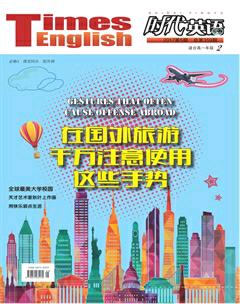跟踪导练(三)等
閱读理解
A
In Singapore, most of us love window-shopping while some others enjoy having a picnic at East Coast Park or Changi Beach on sunny days. Singaporeans are never bothered by the occasional thunderstorm. However, we know that if it rains for long continuous periods, there will be more serious effects. Just recently the main shopping street of Orchard Road was flooded and some part of Bukit Timah was impassable to traffic. People reacted by writing in to the newspaper to complain about this! We forget that other countries suffer much worse effects.
Elsewhere, heavy tropical storms often result in floods that ruin crops especially in Thailand and Malaysia. This in turn usually means that the price of rice and vegetables here in Singapore will rise because we import these products from them. If there is a typhoon or tsunami, thousands of lives are lost too. This happened in Indonesia and Phuket in Thailand in 2004 and it serves to remind us of how Mother Nature can cause great damage.
Weather patterns in general have changed dramatically in recent years. Scientists believe that global warming and the resulting melting of the polar ice-cap has caused the level of the ocean to rise. This in turn causes flooding of low-lying areas in countries where the land is rather flat and some parts of which is below water level. It is believed that human activities have caused Mother Nature to show her extreme anger, so it is now important that we really work together to cut down on harmful activities, for example, illegal logging (伐木) or irresponsible forest-burning to clear land for farming.
1. From Paragraph 1, we can learn that most Singaporeans love ___ .
A. making complaints
B. going out for picnics
C. doing window-shopping
D. traveling along the coast
2. What will happen in Singapore if there are floods in its neighboring countries?
A. Heavy tropical storms will follow shortly.
B. The price of rice and vegetables will go up.
C. More rice and vegetables will be imported.
D. Many people will write in to the newspaper.
3. What does the underlined word “it” in Paragraph 2 refer to?
A. The import of rice and vegetables.
B. The loss of lives in natural disasters.
C. The arrival of heavy tropical storms.
D. The rising price of rice and vegetables.
4. Which can correctly describe how the flooding appears in the low-lying areas?
a. global warming
b. the rise in ocean level
c. harmful human activities
d. the flooding of low-lying areas
e. the melting of the polar ice-cap
A. c→a→e→b→d B. a→c→e→b→d
C. c→a→b→e→d D. d→a→c→b→e
B
A farmer grew some vegetables in his garden. One day his wife was ill and he had no money. He had to sell some cabbages and carrots in the market. The next morning he took two baskets of vegetables to town. But it was raining hard that afternoon and there were few people in the street. When his vegetables were sold out, it was dark. He bought some medicine and hurried to his village.
On his way home he saw a person lying on the snow. He placed his baskets on the ground and was going to help the person to get up. At that time he found it was a dead man and there was much blood on his body. He was so afraid that he ran away quickly, without taking the baskets with him.
The next afternoon the farmer was sent to the police station. Having shown the baskets, an officer asked, “Are these yours?” “Yes, sir.” the farmer answered timidly (膽怯地). “Have you killed the man?” “No, no, sir.” the farmer said in a hurry. “When did you see the dead man?” “About seven last evening.” “Did you see who killed the man?” “No, sir.” The officer brought out a knife and asked, “Have you seen it yet?” “No, sir.” The officer became angry and told the policemen to beat him up and sent him into prison.
That evening the officer went on trying. Pointing to the knife, he asked again, “Have you seen it yet?” “Yes, sir.” The officer was happy and asked, “When and where?” “I saw it here this afternoon, sir.”
5. Why did the farmer decide to sell the vegetables?
A. To go to see a doctor.
B. To get around in the city.
C. To buy some food for his family.
D. To buy some medicine for his wife.
6. Why didnt the farmer sell out his vegetables until the evening?
A. They were too bad.
B. They were very expensive.
C. It rained hard that morning.
D. There were few people on such a bad day.
7. Why did the farmer decide to help the person to stand up?
A. He was ready to help others.
B. The person was one of his friends.
C. He thought the person would thank him.
D. He thought the person had drunk too much.
8. Why did the officer ask the farmer so many questions?
A. To ask if he had seen the knife.
B. To know who had killed the man.
C. To ask when he saw the dead man.
D. To know if he had seen the dead man.

